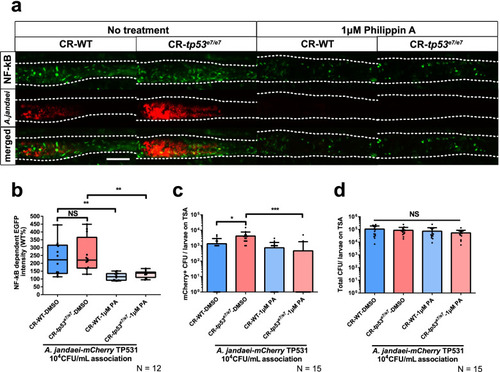
Elevated NF-κB signaling by exogenous Aeromonas in tp53 mutants was abolished by Philippin A derived from nature product. a Representative images of elevated NF-κB signaling and colonization by exogenously added mCherry-tagged A. jandaei TP531 in WT and tp53 mutants with or without Philippin A (1 μM) treatment. White dashed lines denote boundaries of GITs based on DIC bright field images. Scale bar = 50 μm. b A boxed plot showing that elevated NF-κB signaling monitored by Tg(NFκB:EGFP) in the mid-distal intestines with mCherry-tagged A. jandaei TP531 was abolished upon Philippin A treatment. c A bar graph showing that the enhanced survivability of mCherry-tagged A. jandaei TP531 in tp53 mutants was abolished upon Philippin A treatment. d A bar graph showing that Philippin A treatment did not significantly affect total bacterial populations on TSA plates. The boxed plot and bar graph were statistically estimated by non-parametric Friedman test followed by Dunn’s multiple comparisons test. Data are represented as mean ± SEM. *< p = 0.05; **< p = 0.01; NS not significant
|

